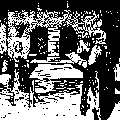29. The Invention of Printing
"In times ere yet the Press had blest mankind Perish'd unknown the noblest works of mind. " —M'CREERY. It seems strange at first sight to connect the discovery of printing with the discovery of new worlds and the navigation of new seas. But it was just at this time that the invention of printing began to play its large part in the world's history. You can imagine how eagerly men would print in books the accounts of the new lands, and how their hearts would glow as they read of the adventures of the stout-hearted sailors who went on voyages of discovery.
The first book was printed in Europe just ten years before the death of Prince Henry the sailor.
But how did men read books before this? Everything was copied by hand. The old Egyptians, Greeks, and Romans wrote with sharply pointed instruments on sheets of dried skins, or papyrus made from reeds. They wrote on one side only and rolled it up. A long book would be perhaps thirty yards in length. These rolls or books were kept in jars or wooden boxes, a number of which formed a library. They could only be read by the learned: among the people there were no books at all.
Now two countries—Holland and Germany— claim the honour of having invented printing. Nobody quite knows which is right, so here are the two stories.
The men of Holland say that at Haarlem lived a man called Coster. One day he took a walk and cut letters on the bark of a beech-tree. He took them home and printed them on paper to amuse his children. Then he invented a kind of printing ink to put on the blocks of wood, so that they left a mark on the paper. Soon after this he made letters of tin and lead, getting some workmen to come and help him. One night, when Coster was out, one of his workers called John stole all the metal letters, and taking them to Germany, set up a press for himself.
But the Germans say that a man called Gutenberg invented printing at a city on the Rhine,—that he first thought of making pictures in wood and impressing them on paper by means of ink. Then he made letters or type of metal, and after seven years of hard work he printed a copy of the Bible. The secret of the printing-press soon escaped to other parts of Europe, and presses were set up everywhere. Venice, Spain, and France caught the printing fever, while England was not far behind them.
The story of how Caxton introduced printing into England is always interesting. News of Gutenberg's discovery reached him, and he went off to Germany to learn the art, knowing what a gain it would be to his country. For thirty-five years he laboured abroad, after which he returned in triumph to England, bringing with him his treasure—a printing-press and a book containing a history of Troy, which he had translated and printed with great labour.
"For my pen is worn, my hand weary, mine eyes dimmed with overmuch looking on the white paper, and my courage not so ready to labour as it hath been," he says pitifully in his preface. There were no bookbinders in those days; so he bound the book himself, and very clumsy it must have looked. The wooden boards between which the leaves were fastened were as thick as the panel of a door. They were covered with leather. Outside on the cover were large brass nails with big heads, the back was stuck with glue laid on thickly, while the book was fastened with a thick clasp.
"No one can carry it about, much less read it," says one, speaking of the very early books printed by Caxton. When other men would have ceased work, this man worked on. He printed book after book of English poetry for the people to read and know. He worked on till the day of his death.
"He was not slumbering when his call came, he was still labouring at the work for which he was born. " It was eventide, and the sun was sending its last red streaks of light into Caxton's little workshop, when four men entered, clothed in black, grave, sad, and downcast. The room looked deserted, papers lay about, the ink-blocks were dusty, a thin film had formed over the ink, the machinery looked oily and unused.
The four men drew in their stools, those stools on which they had sat through many a long day working to the end of some manuscript, encouraged by the master who would now direct them no more.
"Companions," said one, "this good work must not stop. " "Who is to carry it on?" asked one sadly.
"I am ready," cried the first speaker. A cry of joy rose to the lips of the honest workmen.
"Yes," they said, "we will carry on the work briskly in our good master's house. Printing must go forward. " So the faithful workmen carried on the work of their master Caxton, and in the course of the next forty years they had printed four hundred volumes.
So after a time men could read the travels of Marco Polo, the records of the Portuguese explorers, the adventures of Columbus. Maps of the newly discovered regions could be printed, and men's minds opened to the wonders of the world around them.

